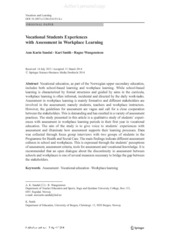Vocational Students Experiences with Assessment in Workplace Learning
Peer reviewed, Journal article
Accepted version
Permanent lenke
https://hdl.handle.net/1956/9096Utgivelsesdato
2014-04-15Metadata
Vis full innførselSamlinger
- Department of Education [300]
Originalversjon
https://doi.org/10.1007/s12186-014-9114-zSammendrag
Vocational education, as part of the Norwegian upper secondary education, includes both school-based learning and workplace learning. While school-based learning is characterized by formal structures and guided by aims in the curricula, workplace learning is often informal, incidental and directed by the daily work-tasks. Assessment in workplace learning is mainly formative and different stakeholders are involved in the assessment; namely students, teachers and workplace instructors. However, the guidelines for assessment are vague and call for a close cooperation between the stakeholders. This is demanding and has resulted in a variety of assessment practices. The study presented in this article is a qualitative study of students’ experiences with assessment in workplace learning periods in their first year in vocational education. The aim of the study is to give voice to students` experiences with assessment and illuminate how assessment supports their learning processes. Data was collected through focus group interviews with two groups of students in the Programme for Health and Social Care. The main findings indicate different assessment cultures in school and workplaces. This is expressed through the students’ perceptions of assessment, assessment criteria, tools for assessment and vocational knowledge. It is recommended that an open dialogue about the discontinuity in assessment between schools and workplaces is one of several measures necessary to bridge the gap between the stakeholders.
